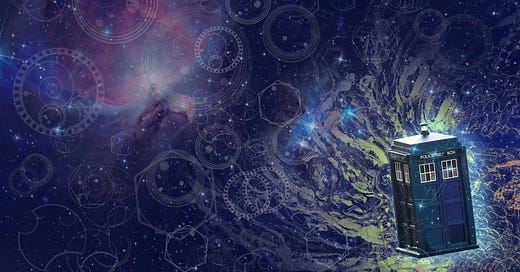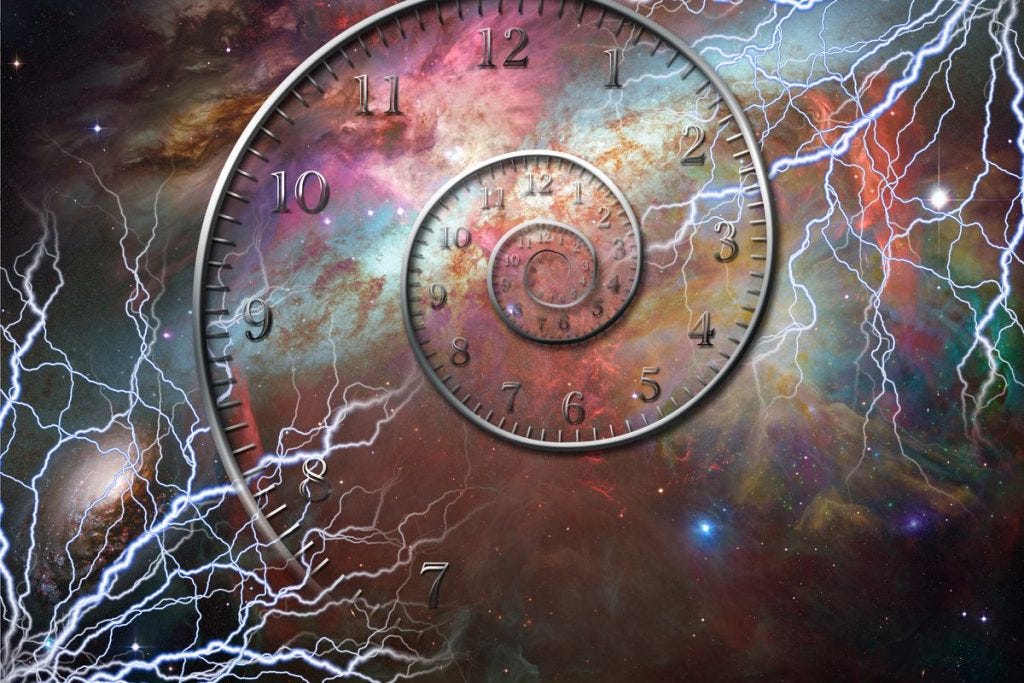There are many “time travel” movies and stories. I usually find them irritating because they strain my capacity for suspension of disbelief. The writers often go out of their way to make the stories extra-contradictory (beyond the inherent incoherence in the central premise).
This all started because of H.G. Wells’ classic novel The Time Machine, which is actually a good novel despite the logically impossible premise. Wells’ novel is good in part because of its novelty and creativity, traits that can no longer be claimed by contemporary time travel stories.
But I digress. My main topic isn’t the aesthetic merits of certain stories. My main topic is metaphysical and conceptual: time travel is metaphysically impossible; indeed, the concept of time travel is inherently, and rather obviously, confused. I thought that ever since I first heard of the idea, and I continue to be struck by how many people are happy to entertain this confusion.
Just in case you are prey to this confusion, let me explain what I mean.
1. The Essential Confusion
The concept of motion is that of an event in which place and time are related in a certain way -- a thing’s place varies over time. The rate of motion is thus represented by “dx/dt”. This is made possible by there being two different things: place, and time. Note that this isn’t a minor or accidental feature of motion; it’s of the essence of the concept of motion.
You can extend the concept of motion to apply to metaphorical “spaces”, i.e., mathematical spaces that aren’t physical space. Thus, e.g., you can talk about “the color space” (a mathematical space in which the points are specific color-shades and the dimensions are hue, saturation, and lightness). You could speak of an object “moving through the color space”, and we could make sense of that. Similarly, you could talk about the “state space” for a physical system (in which the points are specific possible configurations of the system), and you could speak of a system “moving” through its state space.
That’s all good, because these other things can be related to time in the same way that position can be related to time when a thing moves in the literal sense (i.e., moves through physical space). You can have a non-trivial dc/dt or ds/dt (where c is color and s is physical state). I.e., these other properties can vary over time.
The one thing you obviously can’t talk about moving in is time itself. Time cannot be related to time in the way that space or color or physical state could be. A thing cannot “vary its time over time”. There can’t be a non-trivial “dt/dt”. That’s the essential confusion.
2. The Past Is Not in the Future
Here is a story about “traveling into the past”:
In the year 2100, Marty got into a time machine. Then, he got out of the time machine in the year 1900.
That’s contradictory. That story says that an event happened (getting into the time machine) and another event (getting out of the time machine) occurred both after and before the first event. (“Then” indicates something happening after, but the year 1900 is by definition before, not after, the year 2100.) So that’s obviously impossible.
Both parts of that are essential to the concept of “traveling into the past”. Obviously, Marty has to get out of the time machine in a past year. But also, the guy stepping out of the time machine has to be a later stage of the guy stepping into the machine. Otherwise, it isn’t a case of that person going into the past. But by definition, the guy stepping out of the time machine can’t be a later stage of the guy stepping in, because the-guy-stepping-out-of-the-time-machine occurs earlier than the-guy-stepping-into-the-time-machine.
3. Being in Two Places at Once
Here’s a plausibly necessary metaphysical principle: A material object cannot be wholly present in two places at once. E.g., I could not be in Paris and Denver at the same time. (A part of me might be in Paris while another part was in Denver, but it couldn’t be that the whole me was in both places at once.)
If you could travel into the past (to a time after your birth), you would violate this principle. You (the time traveler) and you (the younger version) would be the same person in two separate places.
The same applies to any material object. You could throw any physical object into the time machine, and then the elementary particles of which it is made would wind up each being wholly present in two places at once.
4. Conservation of Energy
Of course time travel would violate conservation of energy, making it physically impossible, though not necessarily metaphysically impossible. Conservation of energy means that the total mass/energy of the universe is constant over time. If you send an object (with nonzero energy) “to another time”, what that actually means, physically, is that the energy of the universe goes down right after the object goes into the time machine; also, at some other time the energy goes up.
5. Backward Causation
I think backward causation is impossible. That’s causation in which the effect occurs before the cause. This rules out travel into the past, since the concept of time traveling into the past requires that the-person-getting-out-of-the-time-machine is caused by the-person-getting-into-the-time-machine in the future. This is impossible because the event of the person getting into the time machine hasn’t happened yet.
I don’t have a further argument for this; I just think it’s self-evident that an event happening now cannot be caused by something that hasn’t happened. I think that’s about the most obvious thing one can say about causation, and I think there is no reason for doubting this principle.
6. Extra-Incoherent Stories
Most time travel stories in science fiction are even more incoherent than the above arguments suggest. Authors regularly go out of their way to contradict themselves. Let me illustrate with some amendments to my earlier time travel story:
In 2100, Marty got into a time machine. Then, he got out of the time machine in the year 1900. Upon doing so, he located his great grandfather, who was then a baby. Marty killed his great grandfather. This prevented one of Marty's grandmothers from being born, which in turn stopped Marty’s mother and then Marty himself from being born. So Marty never came into existence, so then he didn’t get into the time machine in 2100 after all.
I’ve made the contradiction explicit there: The first sentence says Marty got into a time machine in 2100, while the last sentence says this did not happen. So it’s a straightforwardly contradictory story.
Time travel stories often contain contradictions like this. I.e., they regularly depict events going a certain way at a certain time, then, later in the movie (or show, novel, etc.), they depict events going some different way at that time, as a result of the intervention of the time traveler. Somehow, I guess the audience doesn’t always notice that this is just straight-out contradictory? An event cannot both happen and not happen at the same time.
This problem is commonly discussed in terms of “the grandfather paradox” (wherein a time traveler kills his grandfather before the time traveler’s own parent was conceived). But notice that an inconsistency is present if the time traveler is depicted as changing anything at all about the past. To change a thing means that the thing is one way at a given time, then you do something which causes the thing to be a different way at a later time. One cannot change the past because a past event can only be the way that it is at the time it happens. E.g., the events of 1900 only happen in 1900. They don’t then happen again in a different way at some later time.
Btw, a rare exception is the movie 12 Monkeys, which depicts time travel without the incoherence of “changing the past”. In it, the events of the 1990’s (“the past”) never occur without the time traveler; the time traveler is already there the first and only time that the past happens, and the stuff the time traveler does in the 1990’s partly causally explains why the world is in the state it is in in 2035, when the people of that time decide to send the time traveler back. They also do not try to prevent the deadly disease outbreak in 1996 because they know that any such attempt would fail, since they know that the outbreak did in fact happen. That’s an example of one of the less-irritating time travel stories, since it doesn’t go out of its way to contradict itself as other movies do. Of course, you still have backward causation and circular causation, but that’s better than self-undermining causation.
7. David Lewis’ Nonsense
Unfortunately, David Lewis wrote on this subject, with the consequence that I can’t leave this subject without commenting on him, or other philosophers will go crazy.
David Lewis was the most well-respected analytic philosopher who was also completely out of his mind. He wrote about many different topics, usually taking absurd positions and defending them with clever, completely unconvincing, word-game arguments. This issue was no exception. Here, he defended the possibility of time travel (of course).
The short version: He responds to the problem of section 2 (a past event cannot be in the future) by positing two times. He says that the time traveler has a “personal time” (his own time dimension), which is distinct from “external time” (the time of the rest of the universe). So [Marty getting out of the time machine] is earlier than [Marty getting into the time machine] in external time, yet later in Marty’s personal time.
Reply: There is no reason at all for thinking that there are two times. There is no reason for thinking that Marty, or anyone else, has their own time dimension. Note that since you could throw any material object into the time machine, the view apparently requires saying that there are an enormous number of time dimensions – one for every physical object in existence (including combinations of physical objects).
Lewis tries to explain what personal time is: You see, there are certain physical processes that normally happen in a human body (like deterioration of cells with age, the accumulation of memories in the brain, etc.). The instance of Marty that gets out of the time machine in 1900 is a little bit further along with respect to those processes (i.e., he’s in a state that would normally happen later in external time) than the version of Marty in 2100. That makes the 1900 Marty count as “later in Marty’s personal time” than the 2100 Marty.
What’s my problem with that? Well, just because there is a way that things normally develop in a human body is no reason at all for claiming that there is a distinct time dimension attached to that body. There is only the normal time dimension that all events in our universe are located in. We can explain everything using that; we don’t need to posit any other times.
Ex.: Suppose that one time, some cream that was dispersed in a cup of coffee gathered together into the middle, just by chance. This is the opposite of the order in which things normally happen; normally, cream disperses. This would not mean that the coffee was going backward in time, or that the coffee had its own time distinct from the time of the rest of the universe, or anything like that. I think it’s just obvious on its face that those would be utterly confused and unwarranted conclusions. Rather, it would mean that things happened in the reverse order that they usually do: a thing that usually happens later instead happened earlier. That’s all.






Thank you! You undid a great confusion in my mind with this last paragraph about entropy.
People like to say that entropy creates time, or is the source of time. I now understand the source of the confusion.
When I was in high school I read the novel "Lightning", by Dean Koontz, a thriller / potboiler with time travel, but I remember even then thinking it was uncommonly smart, because it essentially went through the reasoning you describe above when the time-traveling protagonist explains why travel to the past is impossible (and it's a big twist when this protagonist reveals he is not from the future, but from the past). It still suffers from a variant of the problems you describe, because time travelers can still return to the past (albeit always later than they left).